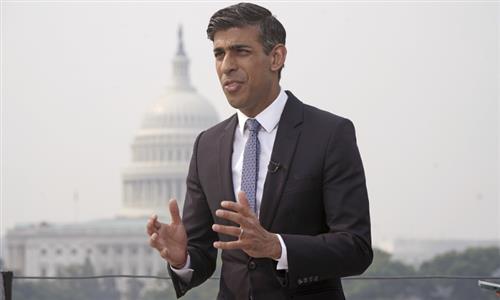With limited room for independent action, can UK grasp key to China-UK relations?

British Foreign Secretary James Cleverly Photo: AFP
The UK Foreign Secretary James Cleverly may visit China in July, according to Reuters, citing people with knowledge of the plans. Experts believed the UK chose to release the news at this time, possibly because the US Secretary of State Antony Blinken is about to visit China. This indicates a certain synchronicity in foreign policy between the UK and the US.
Wang Shuo, a professor with the School of International Relations at Beijing Foreign Studies University, told the Global Times that the UK's move can be seen as following the trend. French President Emmanuel Macron's recent visit to China has caused some controversy in Europe but has also yielded significant benefits. In addition, leaders of other major European countries have also visited China recently. In such an atmosphere, it is not surprising for UK officials to visit China.
In fact, there is intense debate in many Western countries about what kind of policy to adopt toward China. This controversy can be seen in Germany's new National Security Strategy, and even in the US, there are different voices regarding China. The same is true for the UK, where there are various diverse opinions within the country. Rational voices are advocating for competition based on actual circumstances and cooperation when necessary, rather than adopting a blindly tough stance toward China, Wang noted.
Moreover, the UK is a country built on commerce, so it should not have imposed so many constraints on itself in the first place. In particular, some business people in the UK believe that the Chinese market cannot be abandoned, and that the China-UK relationship is indeed very important for enterprises. China is both a crucial market and an area for investment.
Some hawks in the UK have criticized Cleverly heavily for his advocacy for engagement with China. The UK Labour MP accused Cleverly of being a "Chinese stooge" over a possible trip to China. In response, Cleverly said: "The idea that the Foreign Secretary interacting with another government is anything other than my duty and my responsibility is nonsense. It is literally my job."
Party strife has become normalized in the UK, and exploiting issues related to China has become a tactic for politicians to attack each other, which is a worrisome trend. Hyping up China-related issues as a political tool and a means to curry favor with the US will derail the China-UK relationship from the normal track of national interests, which is abnormal, Wang stated.
Bloomberg referred to Cleverly's reported China visit as "Sunak's balancing act." However, Li Guanjie, a research fellow from the Shanghai Academy of Global Governance and Area Studies, under the Shanghai International Studies University, pointed out that it is unrealistic for the UK to adopt both a hostile and engaging stance toward China simultaneously.
Li believed that if a balance can be achieved, it may enhance the UK's international standing and bring practical benefits. However, the reality is that the UK needs to take multiple factors into consideration such as the strategies of the US and certain European countries, as well as its own varying domestic understandings and attitudes toward China.
Wang echoed these views. After Brexit, the UK cannot achieve a balance in either its independent choice of external strategic direction or the degree of domestic political harmony. In other words, no matter what the prime minister does, there will always be opposition, which is the current reality of the UK politics and constrains the government's governance capabilities.
Internally, the Sunak government needs to consider the support of MPs, party members, and the next general election. Externally, the UK has chosen to follow the US, even if it wants to make efforts in certain areas for its own interests, it will face significant constraints from pro-US forces and the US itself, which makes it more difficult for the UK to develop ties with China.
In such a situation where both domestic and foreign policies are severely constrained, the Sunak government has very limited freedom. At times, they can only adopt a tough stance for the sake of being tough and align with the US for the sake of being pro-American, which is also a source of sorrow. London has already sunk into a quagmire, with limited room for independent action.
In this context, in the future, the relationship between China and the UK may witness more competition and less cooperation. This is not because China is unwilling to cooperate with the UK, but due to the peculiarities of the UK's domestic and foreign politics. China maintains an open attitude, but the future of China-UK relations depends more on the UK's actions.

